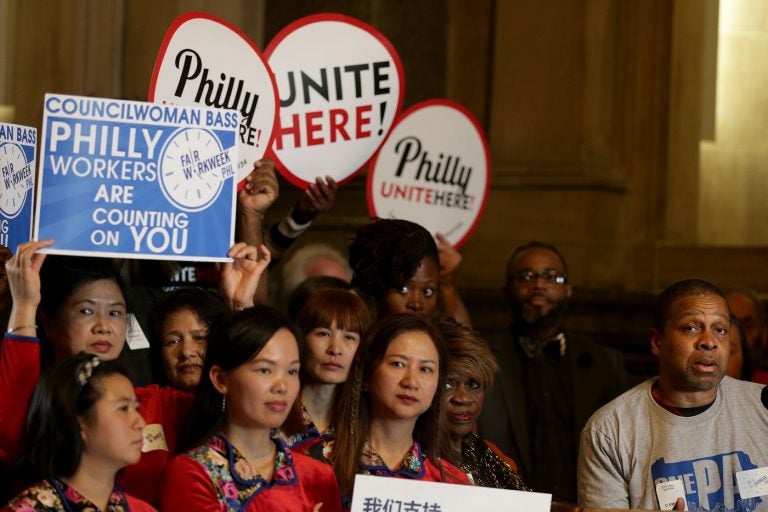City Council votes to move ‘fair workweek’ scheduling bill forward

(David Maialetti/Philly.com)
The “Fair Workweek” scheduling bill for retail, fast-food, and hotel workers in Philadelphia got one step closer to becoming law Tuesday.
After a three-hour City Council hearing that was filled to capacity with a sometimes rowdy crowd of workers and advocates, its Committee on Law and Government voted 6-2 in favor of moving the law to a full Council vote, with Councilmembers David Oh and Brian O’Neill voting against it. The law proposes requiring companies with more than 250 employees and more than 30 locations to give workers their schedules 10 days in advance and pay them if changes are made after-the-fact. (An earlier version of the law listed two weeks’ notice, but the proposed 10 days for the first year of implementation was a last-minute amendment.)
The stakes are high. Championed at the hearing by advocates, union leaders, and researchers as a way for workers to gain more control over their lives and break out of a cycle of poverty, “Fair Workweek” laws have been implemented in cities like San Francisco, New York, and Seattle. But Philadelphia, the poorest big city in the nation, has not seen job growth like other cities have, as Deputy Commerce Director Sylvie Gallier Howard pointed out during the hearing, so she warned of laws that might hinder job creation.
The law, if passed and enforced — and the latter is an enormous “if” — could have a broad effect on the 130,000 Philadelphians working in retail and food service. In a survey of nearly 700 of those Philadelphia workers, 66 percent said they had unpredictable schedules, according to a February 2018 report from the University of California-Berkeley’s hourly work research center.
Lekesha Wheelings, a cook who’s worked at the Philadelphia Marriott Downtown for 11 years, said she saw her hours fall in 2017 and made $5,000 less than she did the previous year. “You can see that the city is growing in so many ways,” she said. “But sometimes it feels like we’re not getting ahead.”
This bill, she said, is “a way forward for our city.”
The hearing depicted recent shifts in the national labor movement. With union representation at a historic low, organizers and politicians have set their sights on fighting for the rights of workers who aren’t backed by organized labor. But union leaders and their membership showed up to support the bill regardless.
“We realize that the 130,000 workers in the retail, food and hospitality workplaces do not have the benefits and protections that we receive as members of AFSCME,” said Fred Wright, president of municipal workers’ union AFSCME DC 47.
Industry leaders and business groups testified against the law at the hearing, saying it would hurt their bottom line when they already face thin profit margins. These industries are inherently unpredictable, business leaders said at the hearing.
In Seattle, Aramark staffs every event and location that is covered by the law “as leanly as possible,” according to Brian Hastings, Aramark’s district manager. Before the law passed, when business was good, workers would get more hours, he said. Now, because of the “predictability pay” penalty for last-minute shift changes, the company can’t do that.
Hotel managers representing the Greater Philadelphia Hotel Association also spoke out against the law, saying that it could drive up prices and make rates less competitive. Julie Coker Graham, president and CEO of the Philadelphia Convention and Visitors Bureau, reminded Council that the city’s tourism industry is booming. It’s now the city’s second-largest employment sector overall, she said.
In other cities that have passed “Fair Workweek” laws, hotels have not been covered. But hotel workers, too, deal with unpredictable scheduling, as workers at the Philadelphia Marriott Downtown have said.
The retail and hospitality industries compose about 20 percent of the jobs in Philadelphia and are among the fastest-growing in the city, according to data from Mayor Kenney’s workforce plan.
Since Councilmember Helen Gym introduced the bill with seven other sponsors in June, she’s met with lobbyists from national corporations, including Target, according to city lobbying data. She’s also hosted business roundtables to get feedback from the community.
Earlier this month, Gym hosted Seattle Councilmember Lorena Gonzalez, one of the officials who championed the scheduling bill there, to speak to City Council about the merits of the law.
The bill is scheduled for a full vote Nov. 29.
 Philadelphia Media Network is one of 21 news organizations producing Broke in Philly, a collaborative reporting project on solutions to poverty and the city’s push toward economic justice. See all of our reporting at https://brokeinphilly.org
Philadelphia Media Network is one of 21 news organizations producing Broke in Philly, a collaborative reporting project on solutions to poverty and the city’s push toward economic justice. See all of our reporting at https://brokeinphilly.org
WHYY is your source for fact-based, in-depth journalism and information. As a nonprofit organization, we rely on financial support from readers like you. Please give today.




